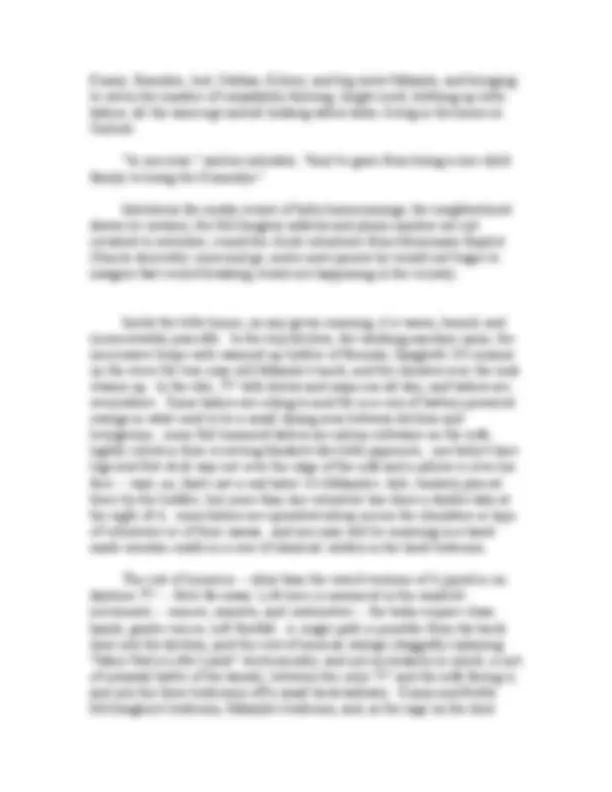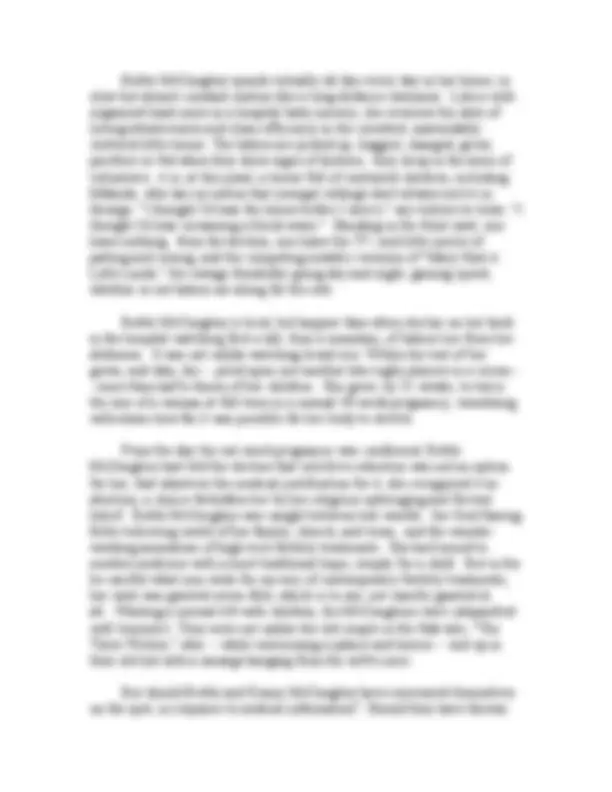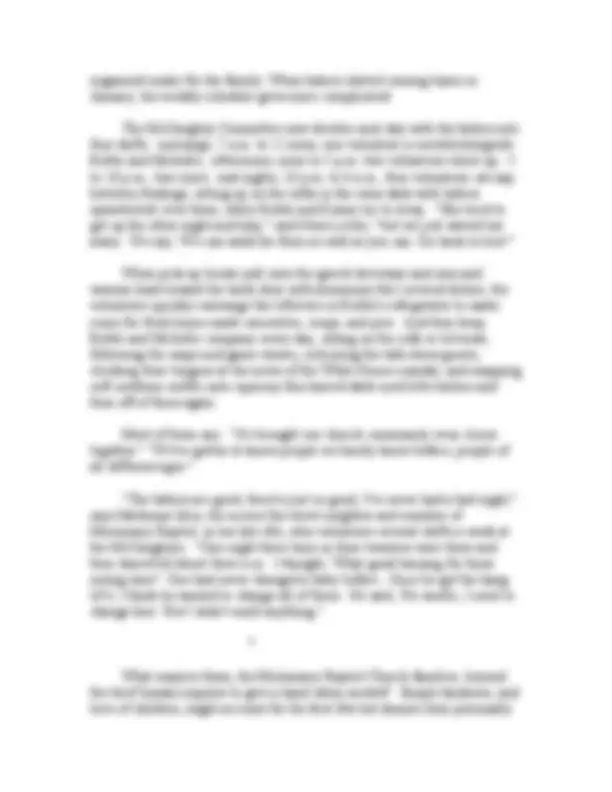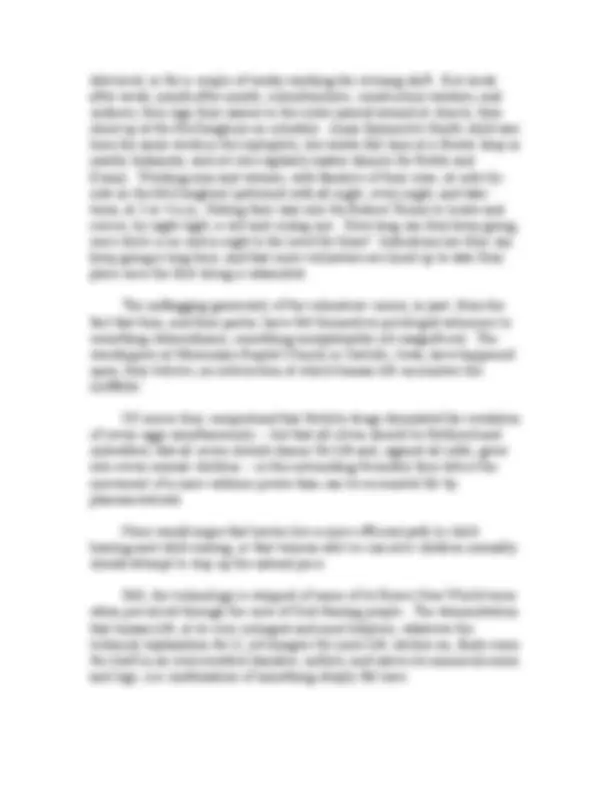











Study with the several resources on Docsity

Earn points by helping other students or get them with a premium plan


Prepare for your exams
Study with the several resources on Docsity

Earn points to download
Earn points by helping other students or get them with a premium plan
Community
Ask the community for help and clear up your study doubts
Discover the best universities in your country according to Docsity users
Free resources
Download our free guides on studying techniques, anxiety management strategies, and thesis advice from Docsity tutors
This document recounts the story of the McCaughey family, who became the proud parents of septuplets after a surprising pregnancy. an insight into the daily life of the family, their reactions to the media attention, and the support they received from their community. Bobbi McCaughey's neighbor, Madonna Isley, shares her experiences of witnessing the homecoming of the babies and the community's response.
What you will learn
Typology: Exercises
1 / 15

This page cannot be seen from the preview
Don't miss anything!










Eight miles from downtown, Des Moines has one last fling, then expires. Beyond the last-chance miscellanea of Motel 6, Budget Storage, the airport, Dairy Queen, and a car junkyard, the city gives out and the great plains rush in. Cornfields in winter, full of gold stubble and with snow in the troughs, run to the horizon in every direction. There are silos, frozen lakes, bare orchards. To the southeast, twin towers stand like castle turrets in the haze: the immense grain elevator and flour mill, skyscrapers of the American heartland, watch over this world of quiet plenty. It is a clean and dignified landscape, the soil's legendary richness supporting tidy farms, riverbank hamlets, restrained townsfolk, and a cornucopia of churches. Carlisle, Iowa, population 3400 -- or 3407, as someone amended the sign after a recent six-minute baby boom -- is a town so small that the school sits on School Street. To reach the Mayor, you phone his house and listen to a message that says: "You've reached the home and office of Mayor Ray Schlicher...For City of Carlisle business, press 3." Downtown is a four-way stop. A solid percentage of the citizens are retired farmers. There are eight churches. Church, and softball, are the way of life.
It is a town so small that, when asked about the high school drop-out rate, folks turn to one another with concern and ask, "Have we had any drop- outs?" "I'll tell you how modest this town is," said Mayor Schlicher, an open, boyish man of 39. "I recently received a phone call from a teacher who planned to show a rented video to a classroom of kids. She phoned here first to get a legal reading on the situation. She'd been alarmed by the FBI warning."
On a residential street in Carlisle, a street that runs on beyond the neighborhood into the prairie, in a boxlike aluminum-sided house of perhaps 600 square feet, live a mother, a father, a toddler, and seven very famous little babies. Absolutely nothing of their presence, of their fame, is discernible from the sidewalk. Occasionally the street erupts into a Los Angeles of sound-trucks, rental cars, film crews and newscasters jockeying for a glimpse of something. The occasional media log-jam is how the neighbors get news, since, being Iowans, they are prone not to pry. "Oh yes, I came home from work one day and I saw all those trucks," recalls Madonna Isley, Carlisle bank teller and Bobbi and Kenny McCaughey's across-the-street neighbor. "I rolled down my window and asked one young man, 'Is a little someone coming home today?' and he said, 'A little someone is already home.'" That scene marked the arrival of Kenneth, on January 3, 1998, the first of the world's first living septuplets to enjoy the ride home in a carseat from the Iowa Methodist Medical Center in Des Moines to his own back door. Over the next three weeks, almost all ahead of schedule, the other babies came home by ones and twos. One almost pictures the Christmas season, with frequent package delivery, a UPS truck pulling up every other day in front of the house: "Miz McCaughey? Baby for you. Sign here." And she, sighing, "Where am I going to put this one?" Or perhaps, as one citizen mused, it was like someone had painted a target on the roof of the house, and storks swerved out of formation from all over the Midwest to swing low over Carlisle. "Incoming!" Finally, Alexis and Natalie McCaughey, to the joy of their parents, grandparents, and doctors, made the trip home from the hospital, joining
says, "Babies' Room." In Babies' Room, three or four sucked-in 'It's A Boy' helium balloons still scrape feebly against the ceiling, a wall-hanging shoe- holder displays three dozen pair of booties, and packages of new outfits are stacked everywhere, giving volunteers who love to dress babies a delirious variety to choose from. Only the babies' mother knows one from another at a glance, and in the dark. "I need to see their hairstyles," says Bobbi's sister, Michelle Hepworth, who took a leave from college in order to help care for the babies from nine to five every day, on top of her night job. "Brandon! Brandon!" says Mikayla happily, helping to burp a baby. "No, this is Kelsey," volunteer Nora Lively, the Missionary Baptist Church pianist, explains kindly to her. "This is your sister Kelsey. Can you say 'Kelsey?'" "Brandon." "Kenny thinks he knows them," says Bobbi of her husband, who bursts into the house after work every day, the wintry air flowing behind him, his overcoat smelling of snow and his face ruddy from the walk; he seeks out his babies all over the house, in swings and cradles and laps, kissing each one on the head and greeting each by name before turning to give special attention to excitedly squealing Mikayla. "The other day," said Bobbi, "he was holding a crying baby and saying, 'Oh Kenny, what's the matter? What's the matter with Kenny?' And I said, 'Well, he wouldn't know. That's Nathan." "When I came in today," said volunteer Susan Lawrence, a public school teacher, "Michelle handed me a baby and said, 'Who's this?' and I blew it." "You mixed up Brandon and Joel" cried Bobbi from her rocking chair, in mock horror. "I am shocked." "Well, I haven't had Joel," said Susan.
Bobbi McCaughey spends virtually all day every day in her house, in slow but almost constant motion like a long-distance swimmer. Like a well- organized head nurse in a hospital baby nursery, she oversees the state of loving attentiveness and clean efficiency in the crowded, unavoidably cluttered little house. The babies are picked up, hugged, changed, given pacifiers or fed when they show signs of distress; they sleep in the arms of volunteers; it is, at this point, a house full of contented children, including Mikayla, who has no notion that younger siblings don't always arrive in throngs. "I thought I'd hear the house before I saw it," say visitors to town. "I thought I'd hear screaming a block away." Standing in the front yard, one hears nothing; from the kitchen, one hears the TV, and little noises of patting and cooing, and the competing metallic versions of "Mary Had A Little Lamb," the swings fiendishly going day and night, gaining speed, whether or not babies are along for the ride. Bobbi McCaughey is tired, but happier than when she lay on her back in the hospital watching first a hill, then a mountain, of babies rise from her abdomen. It was not unlike watching bread rise. Within the tent of her gown, and skin, lay -- piled upon one another like rugby players in a scrum -
"I heard that Jay Leno did a routine one night about two American women who have written books," said Bobbi. "He presented Hilary Clinton's book, It Takes A Village, and Bobbi McCaughey's book, I Had A Village." She and Michelle and the volunteers on the sofa, all holding babies, all laugh. In town, a woman said: "The McCaugheys were just on late-night TV again. On David Letterman's Top Ten List: 'How We Know President Clinton Is Really in Trouble. Number six: It's been established that he fathered three of the McCaughey septuplets." This woman and her husband chuckled. "Now, that is funny," said the husband. "But, you know, I don't know if it's Baptist funny." Not being members of Missionary Baptist, they quieted down to consider. But later, when the joke was repeated in Bobbi's livingroom, though several volunteers looked up horrified, Bobbi was laughing as she got up to go get a baby. "I get together about once a month with some moms of quads and triplets from Des Moines," says Bobbi. "One said whenever she takes her children to the mall, perfect strangers will come up and say, 'I'm sure glad it's you and not me.Õ "I liked her answer. She says, 'So am I'" What makes much of this happiness, order, and contentment possible is the constant and unassuming presence of volunteers from Missionary Baptist Church. A 140-year-old independent Baptist church, loosely associated with 2,000 churches nationwide in the General Association of Regular Baptist Churches, it is the heart of a local community of about sixty Bible-believing families. "We've always believed in prayer," said Pastor Robert Brown, a native Ohioan ordained in 1978. "This was the most dramatic demonstration to answered prayer I've ever seen in my life. I say, 'God, why did we have seven wonderful babies born? I don't understand it. Who are we, that God would demonstrate his power in this way?" Missionary Baptist has made the McCaughey family one of its ministries and some 75 people involve themselves in this form of service. A "McCaughey Committee" was first established in the church last summer, when the congregation was let in on the news. With Bobbi assigned to bed- rest at nine weeks, and admitted to the hospital at 26 weeks, the committee
organized meals for the family. When babies started coming home in January, the weekly schedule grew more complicated. The McCaughey Committee now divides each day with the babies into four shifts: mornings, 7 a.m. to 12 noon, one volunteer is needed alongside Bobbi and Michelle; afternoons, noon to 5 p.m. two volunteers show up; 5 to 10 p.m., two more; and nights, 10 p.m. to 6 a.m., four volunteers cat-nap between feedings, sitting up on the sofas in the semi-dark with babies sprawled all over them, while Bobbi and Kenny try to sleep. "She tried to get up the other night and help," said Nora Lively, "but we just waved her away. We say, 'We can walk the floor as well as you can. Go back to bed.'" When pick-up trucks pull onto the gravel driveway and men and women head toward the back-door with aluminum foil-covered dishes, the volunteers quickly rearrange the leftovers in Bobbi's refrigerator to make room for fresh home-made casseroles, soups, and pies. And they keep Bobbi and Michelle company every day, sitting on the sofa or loveseat, following the soaps and game shows, criticizing the talk-show guests, clucking their tongues at the news of the White House scandal, and snapping soft newborn outfits onto squirmy thin-haired dark-eyed little babies and then off of them again. Most of them say: "It's brought our church community even closer together." "We've gotten to know people we barely knew before, people of all different ages." "The babies are good, they're just so good, I've never had a bad night," says Madonna Isley, the across-the-street neighbor and member of Missionary Baptist, in her late 60s, who volunteers several shifts a week at the McCaugheys. "One night three boys in their twenties were there and they stayed till about three a.m. I thought, 'What good training for these young men!' One had never changed a baby before. Once he got the hang of it, I think he wanted to change all of them. He said, 'He smells, I need to change him.' But I didn't smell anything."
What inspires them, the Missionary Baptist Church families, beyond the brief human impulse to give a hand when needed? Simple kindness, and love of children, might account for the first few hot dinners they personally
In her wildest dreams, Bobbi McCaughey didn't hope or pray for seven babies at once, nor for the worldwide attention they commanded. She shied away from receiving a headline-seeking visit from a fellow fertility frontierswoman -- the British woman pregnant with eight, who sold, in advance, tabloid coverage of her labor and delivery, but then lost the pregnancy. Nor did Bobbi imagine any outside help -- Val McCaughey had promised to make the rounds with her of Des Moines garage sales and Salvation Army distribution points. Finding herself pregnant with seven, Bobbi and the congregation chose to honor the incomprehensible not as the working-out of unfettered technology nor as the shortest route into Guiness Book of World Records, but as a divine gift. When the church's closely-held secret finally was shared with the world, a slight shadow was cast upon the congregation's sense of joy and mystery by the unexpected and harsh criticisms of outside experts. Doctors described the events only in terms of fertility issues, psychologists warned that Mikayla would feel unloved. "They referred to the babies as fetuses," said a church member. "The media was full of medical ethicists." Nationally televised discussions over whether or not Bobbi McCaughey should have aborted some of her babies left the church members all the more dedicated to helping the McCaugheys, who understood the events exactly as the rest of the congregation did: as the unfolding of something unasked-for and miraculous.
It didn't feel all that ineffable and miraculous at the start, when Bobbi McCaughey lay half-undressed upon an examining table, the subject of a sonogram, as medical technicians searched for the cause of her elevated hormone levels and abdominal pain. In previous visits, no fetus had been located in the uterus, but exploratory surgery had ruled out an ectopic pregnancy. Now she was back, belly exposed, for another ultrasound of the uterus. "The technician called in the radiologist and they were counting something," said Bobbi. "They used the word cyst. I thought they were counting cysts." ONE. TWO. THREE. "I thought, oh no, not only are they not finding a baby, but they're finding all these cysts." FOUR. FIVE. "I heard the word 'sac.' I realized they were counting babies." SIX. "I said, 'You're counting babies, aren't you?'" SEVEN. "And they said, 'Yes.'
"At that point, I was like, 'Get me out of here.' I wanted to get down, I wanted to call somebody. I tried to call my sister, Barbara, and she wasn't home, so I called my mom at work. She's a cashier at Ben Franklin's and she was checking out customers and when I told her, she dropped the phone. I was like, 'Mom?' CRASH!" Val McCaughey, Kenny's stepmother, picked up her shell-shocked daughter-in-law at the hospital and was prevailed upon to wait with her for Kenny to walk home for lunch. Val therefore stood in the small kitchen, Bobbi stood in the livingroom, when Kenny came strolling in. "He was all concerned about the baby," said Bobbi, "had they found it? I said, 'Oh yeah, they found it.' "He said, 'How many?' "I said, 'Sit down,' but he wouldn't sit down. He paced. I sat down. I said: 'Seven.'" "He kind of flipped out. He said, 'No, now this is getting way out of hand.'" Out in the kitchen, Val burst out laughing. "It was such a bizarre response," Val said, "I mean it was like Bobbi had come back from the mall with too many purchases. 'This is getting way out of hand.' But you don't want to laugh because you know he's just in shock." Kenny, thunderstruck, went back to work. That night Pastor Robert and Ginny Brown, phoned by Val and Kenny, Sr., called upon the younger McCaugheys. "Kenny and Bobbi were standing in the kitchen, just dazed," said Pastor Brown, a clean-cut, businesslike, and articulate man. "I said something like, 'Some news today. How are you guys doing?' Kenny was shaking his head, he just didn't know. The McCaugheys live very frugally, very basic, no show; they live within their means, so his initial concern was, 'Pastor, how can I take care of my children?' "The four of us stood there and determined that none of us could understand why in the world this would take place. We held hands and started praying. For Kenny, I said, 'As far as your work and transportaion,
week, there might not be." "At the beginning," said Bobbi, "it was the idea, 'Why has this been done to me? Why is this happening to me?' rather than, 'Why have we been given this?' It felt more like punishment or a curse than a blessing." But there was no second-guessing the doctors, then or later. "We had done everything exactly the same as with Mikayla, same number of shots, same amount of medication," said Bobbi. "At the last ultrasound before the eggs released, we saw three, possibly four, exactly the same as with Mikayla. It wasn't like we saw 10 mature eggs and went ahead as if we didn't care what happened." Val McCaughey prayed: "Lord, if you're going to take all seven, please take them now. Don't let this go on and on. Don't let us get attached to them. If you're going to take them, please just go ahead and take them now."
Week after week, the sonogram showed seven. Bobbi's resistance to the news of this outrageous, absurd, flamboyant bumper crop of young life began to waver. Bizarrely, greedily grateful for life, she began secretly to feel that she wanted the babies, seven babies. "By the end of June for Kenny," she says, "maybe a little earlier for me, I felt we were checking to see if they were all still okay." Kenny went along for an ultrasound, saw tiny tendrils of arms and legs moving in their underwater life; he had been asking Bobbi each week, "How many still there?" but henceforth he asked, "How are all the babies doing?" At one visit, only six heartbeats were located. Bobbi, on the table, plunged into panic and despair. "I knew, rationally, look, you've got six, but at the same time I felt, you've lost a child. 'You've got six.' 'But you've lost one.' Then they found the heartbeat." Word of something strange happening over at the McCaugheys was leaking out. Aware that rumors were flying, Pastor Brown called the McCaugheys and suggested it was time to go public. The following Sunday, a day the congregants who were present swear they will never forget, Kenny McCaughey stood up in front of church. He had asked the congregation to pray for his family when he and Bobbi were unable to conceive a child, and they had prayed and later had welcomed beautiful Mikayla, the result of those prayers. He had asked them to pray
again for conception of a second child, and they had prayed; then he had asked them to pray when there seemed to be problems, and they had prayed. Now he stood to confirm that Bobbi was pregnant and to ask yet again for their prayers: "I ask you to pray for Bobbi's health," he said, "and for the health not of one baby. Not of two babies. Not of three babies, but of seven babies." A hundred-some people sat in total silence staring at the man. If he'd simply waved bye-bye then and ascended to heaven smashing through the ceiling of the church, it would have flabbergasted them only slightly less. In very short order they organized the McCaughey Committee and said nothing to outsiders. By August, Bobbi and Kenny, like any expectant American parents, were making up lists of their favorite baby names. They compared their lists, combined their lists, and then shamelessly didn't eliminate any.
The McCaughey babies, needless to say, do not know that they are famous; nor does Mikayla, busily rushing about with crayons and sippy- cups and baby dolls, know that she is likely the first two-year-old of the human species to get seven younger brothers and sisters at one stroke. In fact, left alone -- if, say, this were the 19th century and Carlisle still a windblown prairie settlement -- the family and town would simply roll along normally. The word "septuplets" is used chiefly by outsiders, by media; around here they are just babies. Even their mother loses sight of the novelty factor. Someone mentioned the 63-year-old woman who'd been in the news for having a baby -- "I know! That was unbelievable! I read about her in the check-out line at the grocery," said Bobbi McCaughey. Chances are the McCaughey children are headed for the same small- town, bike-riding, church-going, hymn-singing, ball-playing, early-bedtime, nothing-to-do-on-Saturday-night childhood that is the natural inheritance of Carlisle's children, that Carlisle adults work to preserve for their children. If the world stays away, local knowledge of the septuplets may register chiefly in the feeling that there are an awful lot of kids on that block.